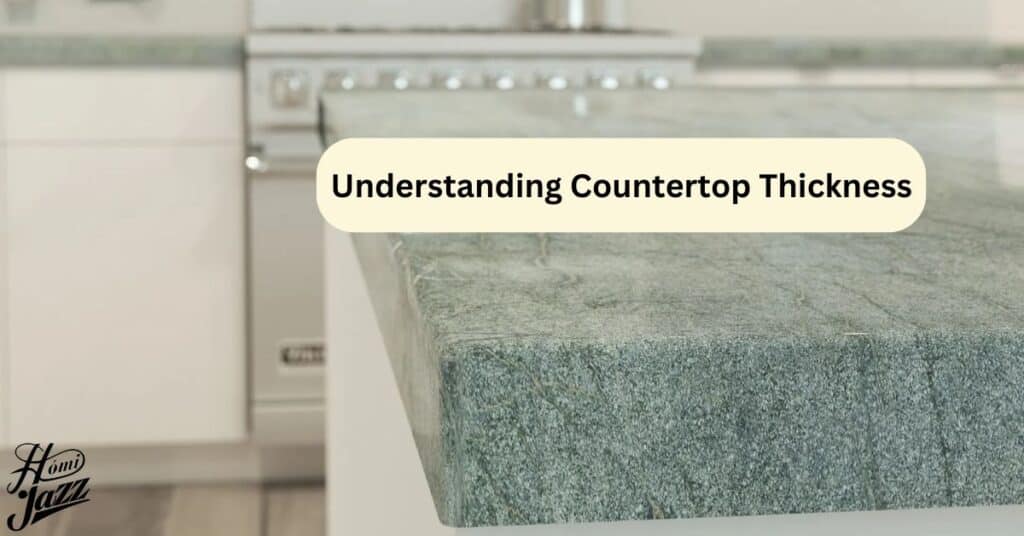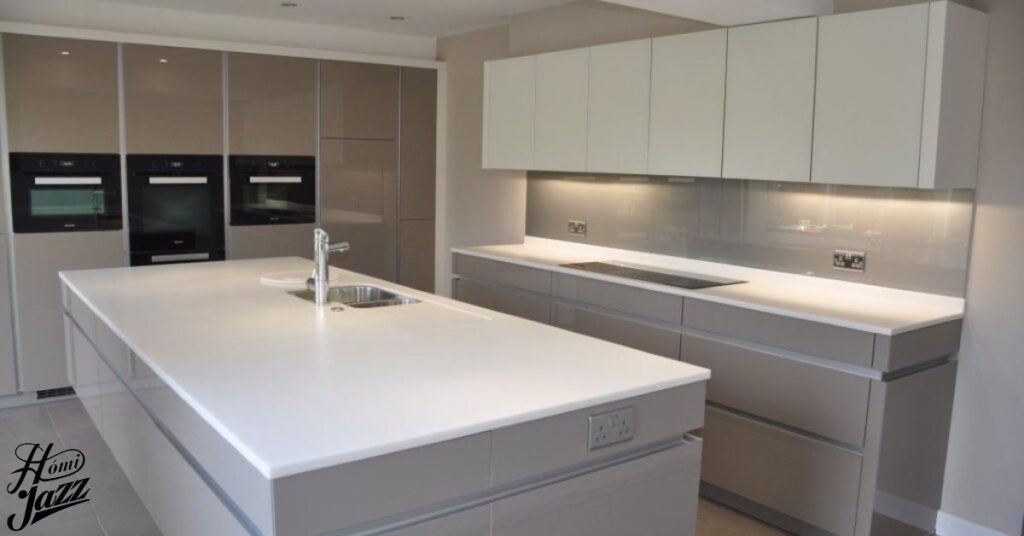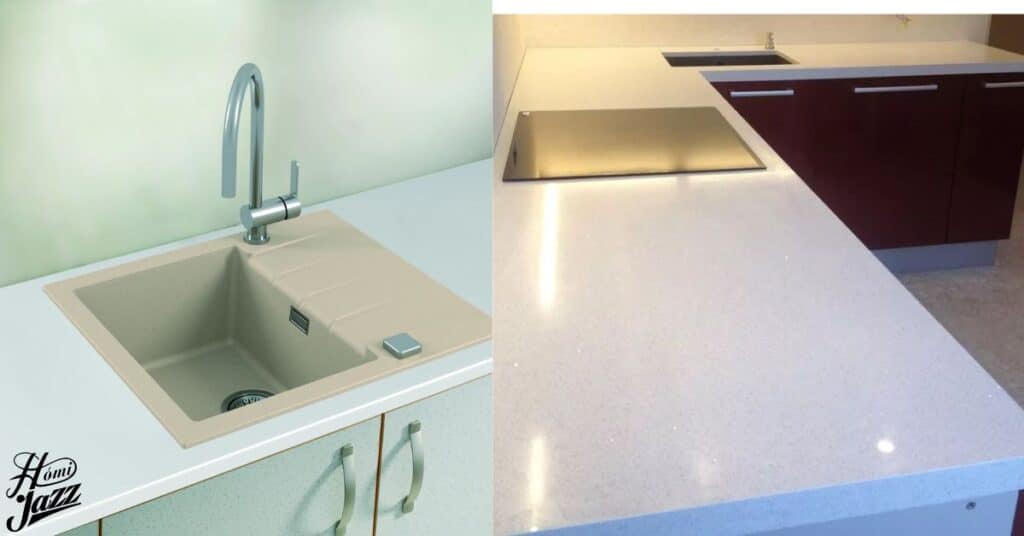In the realm of kitchen remodeling, every detail counts, no matter how seemingly minor. One such crucial detail that can significantly impact the aesthetics and functionality of your kitchen space is the thickness of your countertops.
In this comprehensive guide, we’ll delve into the importance of countertop thickness, explore factors influencing thickness selection, discuss optimal thickness for different materials, and provide valuable tips for choosing the right thickness for your kitchen .
Kitchen countertops vary in thickness depending on the material chosen, ranging from thinner options like laminate at around 0.6 inches to thicker choices like granite at approximately 1.25 inches. The thickness of the countertop can impact both its aesthetic appeal and durability.
Understanding Countertop Thickness

Countertop thickness refers to the measurement of how thick the surface material used for kitchen countertops is. It’s typically measured in inches or millimeters. The thickness of your countertops is crucial for both the visual appeal and durability of your kitchen space.
Thinner offer a modern, streamlined look, while thicker ones provide a more substantial and luxurious appearance. The choice of thickness depends on factors like material type, aesthetic preferences, durability requirements, and budget constraints.
Read this also:http://HOW TO ADD TRIM TO KITCHEN CABINETS
What is Countertop Thickness?
Countertop thickness refers to the measurement of the thickness of the surface material used for kitchen . It is typically measured in inches or millimeters, with standard thicknesses ranging from 0.5 inches to 2.5 inches.
Importance of Countertop Thickness
The thickness of your countertops plays a crucial role in both the aesthetics and functionality of your kitchen space. Thinner offer a sleek, modern look, while thicker ones provide a more substantial and luxurious appearance.
Factors Influencing Countertop Thickness

Countertop thickness is influenced by various factors such as the type of material used, personal style preferences, intended usage, and budget constraints. Different materials have different thickness recommendations, with some homeowners favoring thinner options for a modern aesthetic and others opting for thicker countertops for durability and luxury.
High-traffic areas often benefit from thicker to withstand daily wear and tear. Additionally, thicker countertops tend to be more costly due to increased material and labor expenses, so budget considerations are essential when making thickness decisions.
Read this blog also:http://HOW TO BUILD A PLAY KITCHEN FROM WOOD
Material Type
Different countertop materials have varying thickness recommendations based on their properties and structural requirements. For example, granite and natural stone counters are commonly available in thicknesses ranging from 0.75 inches to 1.25 inches, while laminate counters are typically thinner, ranging from 0.6 inches to 1.25 inches.
Aesthetic Preferences
Your desired look and feel for your kitchen space will also influence the choice of countertop thickness. Whether you prefer a sleek, minimalist design or a more traditional and substantial appearance, selecting the right thickness is essential to achieving your desired aesthetic.
Durability Requirements
Thicker countertops offer enhanced durability and resistance to damage, making them ideal for high-traffic areas such as the kitchen. Thinner countertops may be more prone to chipping or cracking and may require more frequent maintenance.
Budget Constraints
Budget considerations are also important when selecting countertop thickness, as thicker countertops typically incur higher material and labor costs. Balancing aesthetic preferences with budget limitations is crucial to achieving the desired look within your financial means.
Optimal Thickness for Different Materials

The optimal thickness for kitchen countertops varies based on the material used. Different materials offer different levels of durability and aesthetic appeal, influencing the ideal thickness. This aspect is crucial to consider when selecting countertops to ensure they meet both functional and visual requirements.
Laminate Countertops
Laminate countertops are often available in standard thicknesses ranging from 0.6 inches to 1.25 inches. Thinner options are more common due to the nature of the material.
Solid Surface Countertops
Solid surface countertops, such as Corian, typically come in thicknesses ranging from 0.5 inches to 1 inch, offering versatility in design.
Granite and Natural Stone Countertops
Granite and natural stone countertops are commonly available in thicknesses of 0.75 inches to 1.25 inches, with thicker options preferred for enhanced durability.
Quartz Countertops
Quartz countertops are typically offered in thicknesses of 0.5 inches to 1.25 inches, with thicker options chosen for a more substantial appearance and increased strength.
Concrete Countertops
Concrete countertops can range in thickness from 1.5 inches to 2 inches or more, with thickness customizable according to design requirements.
Wood Countertops
Wood countertops can vary in thickness depending on the type of wood and construction, with typical thicknesses ranging from 1.5 inches to 2.5 inches or more.
Tips for Selecting the Right Countertop Thickness
Choosing the ideal countertop thickness involves considering various factors to ensure it suits your kitchen’s design and functionality. Personal taste influences the decision, as the thickness affects the kitchen’s overall appearance, from sleek modernity to a more substantial feel. Budget constraints are important, as thicker countertops often come with higher costs.
The chosen thickness should complement the kitchen’s style and accommodate any appliances or features placed on it. Consulting professionals can provide valuable guidance in selecting the perfect countertop thickness for your needs.
Consider Personal Preference
Choose a thickness that aligns with your aesthetic preferences and complements the overall design of your kitchen space.
Evaluate Budget
Balance aesthetic considerations with budget constraints when selecting countertop thickness, opting for options that offer the best value for your investment.
Match Kitchen Style
Ensure that the chosen thickness harmonizes with the style and theme of your kitchen, whether modern, traditional, or transitional.
Assess Functional Needs
Consider your daily usage patterns and functional requirements to determine the appropriate thickness that can withstand the demands of your lifestyle.
Consult with Professionals
Seek advice from countertop fabricators or suppliers to gain insights into the optimal thickness for your chosen material and design preferences.
Frequently Asked Questions
What is the average thickness of kitchen countertops?
The average thickness of kitchen countertops varies depending on the material, but it typically ranges from 0.6 inches to 1.25 inches.
How thick can the countertop be?
Countertops can vary in thickness based on personal preference and the material used, but they can typically be up to 2 inches thick or more.
How thick is a kitchen granite countertop?
A kitchen granite countertop is usually around 1.25 inches thick, although variations in thickness are possible depending on design preferences.
How thick is a laminate countertop?
A laminate countertop typically ranges from 0.6 inches to 1.25 inches in thickness, with thinner options being more common due to the nature of the material.
How thick are kitchen countertops in MM?
Kitchen countertops are typically measured in millimeters as well, with thicknesses ranging from approximately 15 mm to 32 mm, depending on the material and design.
Are thicker countertops better?
Thicker countertops can offer enhanced durability and a more substantial appearance, but whether they are better depends on personal preference, budget, and specific needs.
Conclusion
The thickness of kitchen countertops is a crucial consideration that significantly impacts both the aesthetics and functionality of a kitchen space. From laminate to granite, each material offers various thickness options, allowing homeowners to tailor their choice to suit their preferences, budget, and specific requirements.
Thicker countertops generally provide enhanced durability and strength, making them suitable for heavy-duty use and adding a sense of luxury to the kitchen. However, thinner countertops can offer a sleek, modern look and maybe more budget-friendly. Ultimately, the optimal thickness depends on factors such as personal style, desired aesthetic, and practical needs, highlighting the importance of careful consideration when selecting kitchen countertops.

Howdy is behind this home blog, sharing personal stories, thoughts, and insights from daily life. I can dedicated to bringing you the latest trends, expert advice, and creative ideas to make your home the sanctuary you’ve always dreamed of. Whether you’re looking for DIY tips, home decor inspiration, home loans, rentals or renovations.







